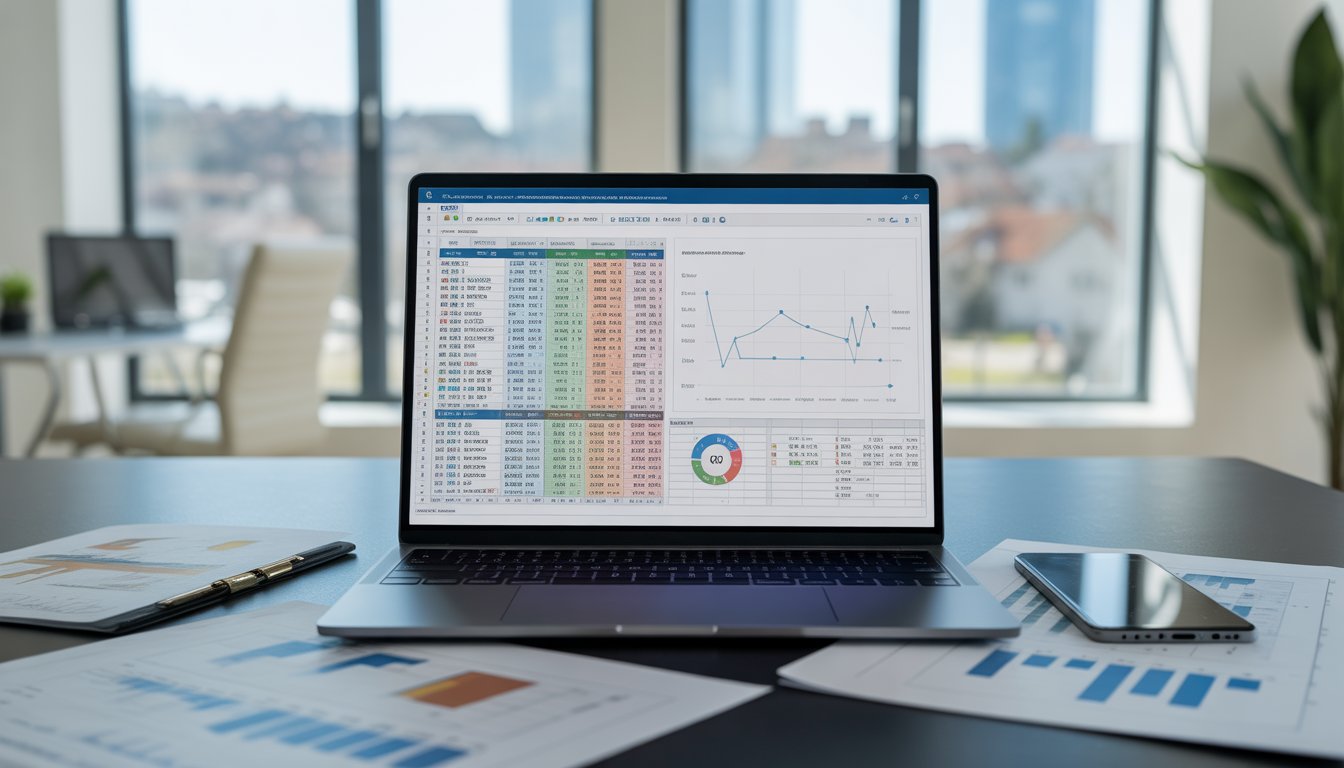Keeping a close eye on your rental property’s performance is crucial for proactive management. By regularly reviewing how your property is doing, you can spot issues before they become major problems and address them efficiently.
Monitoring key performance metrics supports your decisions regarding pricing, marketing, and business operations. Tracking your rental property’s success can help you achieve better outcomes and maintain a stable investment.
Key Takeaways
- Identifying problems early protects your investment
- Regular tracking supports smart business decisions
- Monitoring performance leads to long-term benefits
3 Key Rental Property Metrics To Monitor

1. Occupancy rate
The occupancy rate measures the percentage of your rental units that are currently leased. Keeping a high occupancy rate is vital for stability in your rental income and overall financial performance. You can calculate this by dividing the number of occupied units by the total units in your portfolio. Tracking this key metric also helps with risk management, market research, and understanding trends in rental demand. For more details on how to effectively track real estate KPIs, consider using a spreadsheet for streamlined financial reporting.
2. Cash flow
Cash flow is the money you have left after paying all operating expenses, such as mortgage payments, insurance, taxes, repairs, and maintenance. Evaluating your cash flow is essential for meeting your investment goals and assessing your portfolio’s financial health. Use a cash flow statement to stay on top of revenue, rent collection, and operating expenses. This metric directly impacts your ability to diversify and manage risk factors in real estate investing.
3. Return on investment (ROI)
Return on investment (ROI) quantifies how profitable your rental properties are by comparing net operating income to your total investment, including purchase price and renovation costs. ROI aligns your performance evaluation with your long-term investment strategy. Monitoring ROI helps you make informed decisions regarding market trends, cap rate, and tax planning, ensuring your assets are supporting your long-term investment and financial objectives.
Benefits of Tracking Rental Property Performance
1. You’ll be able to identify trends over time
Understanding how your rental properties perform month over month or year over year gives you valuable insights into patterns that affect your bottom line. Tracking occupancy rates, maintenance requests, and rental income allows you to spot trends early—such as rising vacancies, seasonal fluctuations, or increases in expenses.
With access to this data, you can make timely adjustments to your property management strategy. This could mean refining your marketing approach, reviewing lease terms, or implementing maintenance routines to address recurring issues. Modern property management solutions like AppFolio, Buildium, and DoorLoop streamline this process through features such as automated reporting and trend analysis, helping you remain proactive and data-driven.
A table can further outline what you might track to identify trends:
| Metric | Insight Provided | Value to Property Owner |
|---|---|---|
| Occupancy Rate | Measures rented vs. vacant units | Adjust marketing; forecast revenue |
| Rent Collection Consistency | Tracks late or missed payments | Identify changes in tenant quality |
| Maintenance Cost Fluctuations | Shows increases or spikes in expenses | Plan preventative or major repairs |
These insights encourage you to use technology integration and user-friendly interfaces, like a mobile app, to monitor your portfolio from anywhere.
2. You can benchmark against other properties
Benchmarking performance against similar assets helps property managers and real estate investors see where they stand. By comparing key metrics like vacancy rates, rent levels, and maintenance costs, you identify areas for improvement or opportunities for increased profitability.
Using benchmarking data, you can answer questions such as: Are your rent prices below market average? Do you incur higher repair costs than properties in your area? Benchmarking tools in modern property management software present this information through easy-to-read dashboards and custom reports.
A list of measurable points for benchmarking includes:
- Vacancy rate compared to similar buildings
- Average rent per unit type vs. neighborhood averages
- Expense ratio compared to industry standards
You gain a clearer perspective on your competitive position, which can drive decisions such as repositioning a property, adjusting rent, or investing in upgrades. Tools like KPI dashboards help you track and visualize these benchmarks for more informed decision-making, a practice discussed in guides to property manager KPIs.
3. You’ll have a better understanding of your expenses

Managing a rental property involves more than just collecting rent—it also requires close monitoring of all expenses. By routinely tracking and categorizing costs such as repairs, utilities, taxes, and insurance, you discover which areas are consuming the most resources.
A detailed expense breakdown helps you identify inefficiencies. For instance, if maintenance management expenses steadily increase, it may be more cost-effective to schedule preventative maintenance or negotiate better rates with vendors. If utility bills spike, you can investigate consumption patterns or invest in energy-saving upgrades.
Here’s a sample breakdown for clarity:
| Expense Category | Frequency | Impact |
|---|---|---|
| Repairs | Variable | May signal larger issues |
| Maintenance | Regular | Prevents costly emergencies |
| Utilities | Monthly | Opportunity for efficiency gains |
| Taxes/Insurance | Annual | Fixed cost; plan for increases |
By leveraging technology tools with user-friendly interfaces, such as AppFolio or DoorLoop, you can centralize expense tracking and receive automated insights. This allows you to make more accurate budgets, improve profitability, and confidently plan for the future.
Frequently Asked Questions

How can I effectively monitor my rental property’s financial performance?
You can monitor your rental property’s financial performance by regularly reviewing key financial statements and using property management software. Set up automated tracking for income and expenses to stay on top of cash flow. Leveraging property performance tracking tools can provide snapshots of net operating income, rental yields, and occupancy rates for better decision-making.
What are the essential metrics to track for real estate investment success?
Focus on these important metrics:
- Net Operating Income (NOI)
- Cash Flow
- Cap Rate
- Cash-on-Cash Return
- Occupancy Rate
Reviewing these figures allows you to benchmark your properties and identify areas for improvement. More details about these vital rental property metrics can be explored with dedicated property tracking resources.
Which apps are recommended for managing rental property expenses?
Apps designed for landlords can simplify expense management. Highly rated options include:
- Stessa: Streamlines rental income and expense tracking (learn more).
- Rentastic: Specialized for expense tracking and bookkeeping for landlords (details here).
- REI Hub: Focused on portfolio performance and key performance indicators (see recommendations).
Can you suggest a template for tracking rental property performance?
A standard tracking template may include the following columns:
| Month/Year | Rental Income | Operating Expenses | Vacancy Costs | Mortgage Payment | Net Cash Flow |
|---|---|---|---|---|---|
Templates like this help in systematically logging data for each property. Some management platforms offer downloadable or customizable templates within their property management solutions.
What strategies are commonly used to gauge the profitability of rental properties?
Common strategies include analyzing your cap rate, cash-on-cash return, and annualized ROI. Comparing your rental prices with market rental comps can also aid in evaluating profitability. Regular data reviews and scenario modeling enhance long-term insight.
Are there free tools available for rent and expense tracking for landlords?
Several free tools exist specifically for landlords. Platforms such as Stessa and RentCast.io offer no-cost plans for basic income and expense management. These services can be a useful starting point if you are looking to avoid upfront costs.
Wondering if you’re charging enough rent? Here’s how to know for sure!
Make data-driven rental property decisions with real-time market insights from RentCast.io. Use code BIGDEAL for 20% off your subscription!

Master the art of real estate investing with The Real Estate Property Management Guide: Premium Edition – your comprehensive roadmap to successful property management.
Whether you’re a novice investor or seasoned professional, this guide covers everything from selecting the right investment properties to tenant management and property marketing.
The author, Jeff Rohde writing as Jeffrey Roark, is a professional with over 25 years of real estate experience. This Premium Edition includes the valuable bonus book Investment Real Estate Analysis: A Case Study to help you identify hidden opportunities and evaluate properties like a professional.
Learn practical, actionable strategies for both residential and commercial properties, from single-family homes to office buildings and shopping centers.
Don’t just buy property – learn how to manage it successfully and maximize your investment potential.
Grab your copy now from your favorite bookseller:
- Amazon (Basic Edition, does not include Investment Real Estate Analysis: A Case Study)
- Books2Read for Apple, Barnes & Noble, Kobo, Scribed, and 8 more sellers with both eBook and paperback options available (Premium Edition, includes Investment Real Estate Analysis: A Case Study)
- Payhip as a downloadable PDF (Premium Edition)
Ready to take your business to the next level?
- Subscribe to our newsletter
- Visit the learning center
- Learn more about our consulting services



